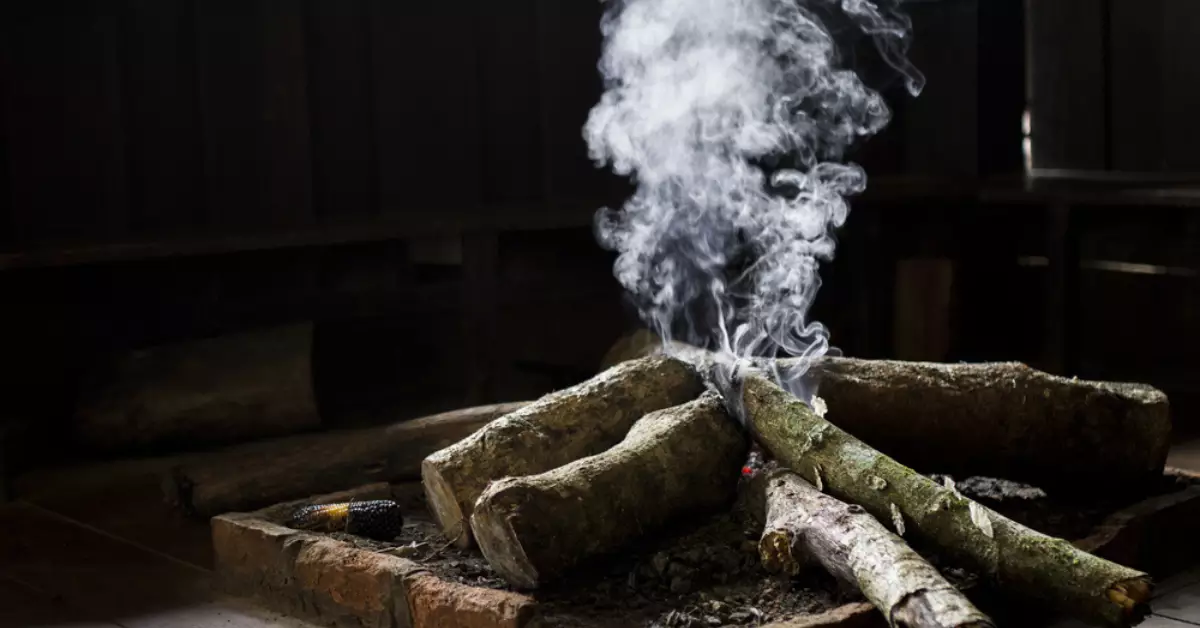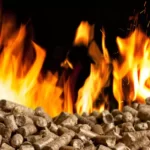Meat smoking, a culinary art passed down from generations, involves slow cooking meat at a low temperature, thereby infusing it with the flavors of the chosen wood. Among the plethora of wood options available, black walnut finds mention for its distinctive attributes. Known for its rich, robust flavor profile, black walnut can indeed transform your smoking experience.
To answer the question directly, black walnut can be used for smoking meat, and it provides a strong, earthy flavor to the dishes. However, its use is subjective and depends on individual taste preferences. Black walnut’s distinct taste may not be appreciated by everyone but it’s certainly worth a try for smoking enthusiasts in search of unique flavors.
Originating from the Eastern and Central regions of North America, black walnut is not just a part of delicious recipes but is also recognized for its diverse applications, including furniture-making and smoking meat. When used in smoking, the robust flavor of black walnut imparts a unique character to the meat, elevating it to an unmatched culinary delight.
The Appeal of Smoking Meat
Historical Importance of Smoking
As an age-old method, smoking meat traces its roots back to ancient times when our ancestors smoked food to preserve it. Smoking not only extended the shelf-life of meat but also enhanced its flavor. Today, although preservation is no longer the primary purpose, the delightful flavors that smoking imparts continue to attract gourmands worldwide.
Smoking Process
The process of smoking involves cooking meat slowly over a low heat source. The magic happens when the smoke from the burning wood envelops the meat, imparting it with a distinctive flavor. Factors such as the type of wood, its moisture content, the temperature, and smoking duration all play crucial roles in determining the final taste of the smoked meat.
Introduction to Black Walnut
Black Walnut: A Brief Overview
The black walnut tree, known scientifically as Juglans nigra, is a native species of the Eastern and Central regions of North America. It is treasured for its dark, hardwood used extensively in crafting furniture, flooring, and cabinets.
But this isn’t where its utility ends. The black walnut also serves culinary purposes – its flavorful nuts are used in a variety of sweet and savory dishes, and its wood, owing to its distinctive characteristics, finds use in smoking meats.
The tree grows up to 75-100 feet, has a round top, and its bark is a deep, dark brown. The wood of the black walnut tree is dense and strong, burning slowly and at high temperatures. This makes it quite suitable for slow-cooking processes like smoking meat. However, the usage of black walnut is still a debated topic among barbecue enthusiasts due to its potent flavor profile.
Nutritional Components of Black Walnut
Black walnuts are a powerhouse of nutrition. They’re rich in:
- Polyunsaturated fats: These are healthy fats that can help decrease bad cholesterol levels.
- Proteins: They are essential for growth and repair of body tissues.
- Vitamins: They are high in vitamins such as Vitamin E and B-vitamins.
- Minerals: Black walnuts contain minerals like potassium, magnesium, and phosphorus.
While these nutritional facts do not influence the smoking properties of black walnut wood directly, they showcase the tree’s overall nutritive value.
Black Walnut for Smoking
Factors That Make Wood Ideal for Smoking
While there’s a wide range of woods that can be used for smoking meat, certain characteristics make some woods more suitable than others. These factors include:
- Hardness: Hardwoods like oak, hickory, and black walnut, are preferable for smoking as they burn slowly and evenly.
- Flavor: The wood must impart a pleasant and appetizing flavor to the meat. This is subjective and can vary between individuals.
- Smoke: Ideal smoking woods produce a steady amount of smoke and don’t flame up easily.
The black walnut wood ticks most of these boxes, but it’s the intense flavor it imparts that makes it a topic of contention among smoking enthusiasts.
Attributes of Black Walnut for Smoking
Black walnut has several attributes that make it suitable for smoking. Some of these include:
- Slow Burning: Black walnut, being a hardwood, burns slowly, providing a consistent temperature ideal for smoking.
- Flavor: It imparts a strong, unique flavor that can be described as earthy and slightly bitter. This makes it suitable for heavy meats.
- Smoke: Black walnut produces a dense smoke that envelopes the meat, enhancing its color and taste.
Taste Profile of Smoked Meat with Black Walnut
The flavor that black walnut imparts to smoked meat is unique. Here’s a taste profile breakdown:
- Smokiness: Black walnut infuses a deep smoky flavor into the meat.
- Earthiness: An inherent earthy flavor comes through when meat is smoked with black walnut.
- Bitterness: Some people might detect a slightly bitter aftertaste, which can add complexity to the overall flavor profile.
Comparing Black Walnut with Other Woods
Popular Wood Types for Smoking Meat
Several woods are popular for smoking meat, including hickory, oak, apple, and mesquite. Each of these woods imparts a unique flavor to the meat. Here’s a brief comparison:
- Hickory: Known for its strong, slightly sweet flavor.
- Oak: Imparts a medium to strong flavor, great for large cuts of meat.
- Apple: Gives a sweet, fruity smoke flavor ideal for poultry and pork.
- Mesquite: Has a strong, earthy flavor best for red meats.
Taste and Smoke Differences
While each wood has its signature taste and smoke, black walnut stands out due to its intense flavor. Unlike the subtle sweetness of apple or the strong, savory flavor of hickory, black walnut has a strong, slightly bitter, and earthy taste that may not appeal to everyone.
As for smoke, black walnut produces dense smoke, which penetrates deeply into the meat, adding a rich color and flavor to it. In comparison, woods like oak or hickory offer less dense smoke and a more moderate flavor.
Pros and Cons
Benefits of Smoking with Black Walnut
- Unique Flavor: Black walnut offers a flavor profile unlike any other smoking wood, perfect for those who crave unique tastes.
- Dense Smoke: It produces a thick smoke that deeply penetrates the meat, enhancing its flavor and color.
- Slow Burning: It burns slowly, providing a consistent temperature ideal for smoking.
Potential Drawbacks to Consider
- Intense Flavor: Its strong flavor might not appeal to everyone, especially those who prefer milder tastes.
- Availability: Black walnut may not be as readily available as other more commonly used smoking woods.
Practical Tips for Smoking with Black Walnut
Choosing the Right Black Walnut Pieces
When selecting black walnut for smoking, look for well-seasoned wood. Green or fresh wood can produce too much smoke and give an unpleasant flavor. Also, ensure the wood hasn’t been treated with any chemicals.
Combining Black Walnut with Other Woods
For those who find the flavor of black walnut too strong, it can be combined with milder woods. This can help balance the flavors.
Safety Precactions While Using Black Walnut
Ensure proper ventilation when smoking with black walnut due to its dense smoke. Avoid inhaling the smoke directly.
Recipes Using Black Walnut for Smoking
Innovative Smoked Dishes Using Black Walnut
From smoking a turkey to enhancing the flavor of a beef brisket, black walnut can be used in various recipes. It pairs well with robust, strongly flavored meats.
Experimenting with Black Walnut in Your Kitchen
Don’t shy away from experimenting with black walnut. Remember, the joy of cooking lies in creativity and experimentation.
FAQs
How should I store Black Walnut wood for smoking?
Black Walnut, like other hardwoods, should be stored in a dry, well-ventilated area away from direct sunlight.
Can I use black walnut wood for grilling?
Yes, black walnut wood can be used for grilling. However, due to its intense flavor, it’s best to use it sparingly or mix with other milder woods.
Is black walnut wood safe for smoking?
Yes, black walnut wood is safe for smoking. However, like any other smoking wood, it should be used in a well-ventilated area.
Conclusion
Black Walnut holds a unique position in the realm of smoking woods. Its strong, slightly bitter flavor offers an alternative to the more commonly used woods. However, taste being subjective, it might not be everyone’s cup of tea.
For those willing to venture out of their comfort zones, black walnut can indeed be an interesting choice. Its slow burn rate and dense smoke make it ideal for smoking, while the earthy and intense flavor it imparts adds a unique touch to the smoked dishes.
Ultimately, the use of black walnut for smoking comes down to individual taste preferences. While some may enjoy its unique flavor, others might find it too intense. The key is to experiment and find the right balance that suits your palate.







